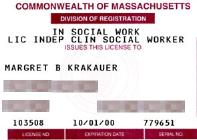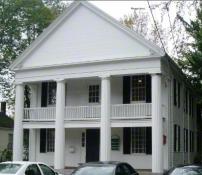
Actually, she takes after her mother, who always talked to Margie's childhood friends when they visited the house. Margie had mixed feelings about this. She was glad that friends were happy to visit, but sometimes felt that they liked her mother more than they liked her. Once a boyfriend, when he broke up with her, expressed regret that he would no longer be able to chat with her mother as frequently. You can get a lot of information just by asking questions. Once, during Margie's social work training, she was finishing up her second and final interview with a married couple. Although she thought she had obtained all the relevant information she would need, she finished with a routine question: "Is there anything else you'd like to tell me about?" The husband replied, "You must be referring to my drinking problem." Margie, having previously heard nothing about any such thing, said, "Uh, I think we may need to have another meeting." I recall a time when I carried some groceries out to our car after a shopping trip. Margie lingered in the market, and was a bit delayed in joining me at the car. When I asked what had taken so long, she told me she had been talking with the woman at the cash register, whom we had never met before. Margie noted that the woman had recently had a hysterectomy, and was going through a messy divorce. I said incredulously, "The checkout lady told you this??!!" I learned a bit about Margie's information gathering methods when a cousin of mine became involved with an organization that the family considered to be a cult. He and his wife-to-be were both involved, and we attended their wedding. Most of their friends at the time were also members of the group, and they comprised most of the guests at the wedding who were not family members. Margie decided that she wanted to know more about the group. I told her that would be really easy, since all she had to do was ask someone. Margie said she would prefer to have someone approach her. I suppose she figured that way, she would get someone who was more interested in proselytizing. While that would clearly be good, I didn't see any way she could cause it to happen. I looked down, and took a bite of an hors d'oeuvre. When I next looked up, I saw that Margie had gone into a far corner of the room. She had pulled up a chair, and was sitting all by herself, looking quite lonely and lost. I looked away again, and took a sip of my drink. When I next looked up, I saw that a man had pulled a chair up next to her, and was talking to her in an animated fashion. Margie was getting a thorough education in the group's philosophy. By the way, my cousin and his wife eventually got fed up with the cult's all-encompassing control of their lives, and they extricated themselves from it. Sometimes the marriages of people who meet within such groups break up when one member of the couple leaves the cult, and the other remains. But in this case, the marriage won out over the group, which they both left at the same time, and they are still together. A friend in New York City, Miriam Fox, got considerable benefit out of chatting with all the merchants in her neighborhood. Visiting local markets when they were not too busy, she spent a great deal of time talking with the proprietors. She asked them about themselves, their lives, their families, and their problems. She once referred to herself as a "butcher talker". In return, she received excellent service, and the butcher gave her the very best cuts of meat. I think she also profited from her friendship with Greenberg the baker. Outsiders think of New York City as gigantic and impersonal, but you can also look at it as an enormous collection of small, intimate neighborhoods.
I've been told that a propensity to chat varies by region within the United States. I once started up a conversation with some people while eating lunch at Quincy market in downtown Boston. They turned out to be on a bus tour of New England, and were stopping only briefly in Boston. One of the women said that she was very happy that I had spoken with them, because she had been told that the people of New England were not very friendly. Indeed, New Englanders have a reputation for being rather private, and keeping to themselves. I didn't tell her that I'm actually from New York. Rhoda, a friend from this area, moved to St. Louis, Missouri. At her previous home in Weston, Massachusetts, she had had a large patch of raspberry bushes, and had made raspberry preserves every year. Missing these in St. Louis, she went out to a market and bought a very large number of boxes of raspberries. As she was checking out, the woman at the register seemed to look curiously at her purchase. So Rhoda briefly explained about her raspberry bushes back in Weston, and why she now had to purchase the raspberries to make her preserves. She kept the story brief, because there were quite a few people in the checkout line behind her, and she figured that they would all be impatient to get through the line. But the checkout woman seemed to be in no hurry, and told Rhoda about a local farm where she could buy raspberries more economically in bulk. She then asked about Rhoda's recipe for the raspberry preserves, and discussed a recipe of her own. Rhoda, who was used to the impatient attitude typical of New England and New York, was afraid that all the people waiting in line behind her would become irritated. Instead, they all joined in the conversation. They talked about the preserves they made themselves, suggested additional recipes and other sources for the berries, and so on. Rhoda was surprised and delighted by this turn of events, and felt it would have been unlikely to have happened in New England. Others have said that such attitudes are typical in southern parts of the United States. And actually, St. Louis is hardly that far south. Maybe Margie can get New Englanders to loosen up a bit. I think she's working on it. Of course, from a personal point of view, the most important person Margie drew out of his shell and got to talk was me.
  Note 1:
Do you like the building? Want to buy it? As I write this in April of 2011, it's for sale for an asking price of $1,175,000, for all 3600 square feet. Do a search on "Olde Collins Market Building" to see the listing - if it's not found, you've probably missed your chance. [return to text]
 |
 Margie seems to have an ability to draw people out, and get them to talk about themselves. I think she comes by this naturally, but she also trained as an independent clinical social worker (see her license from the Commonwealth of Massachusetts to the left, with our address blotted out). She listens attentively, and sometimes asks questions others might be afraid to ask. She says she's naturally "concerned and curious", but her art teacher George Dergalis thinks she's just "nosy".
Margie seems to have an ability to draw people out, and get them to talk about themselves. I think she comes by this naturally, but she also trained as an independent clinical social worker (see her license from the Commonwealth of Massachusetts to the left, with our address blotted out). She listens attentively, and sometimes asks questions others might be afraid to ask. She says she's naturally "concerned and curious", but her art teacher George Dergalis thinks she's just "nosy".
 Our younger daughter used to get quite annoyed that her mother took time to talk with everyone she met.
Our younger daughter used to get quite annoyed that her mother took time to talk with everyone she met.